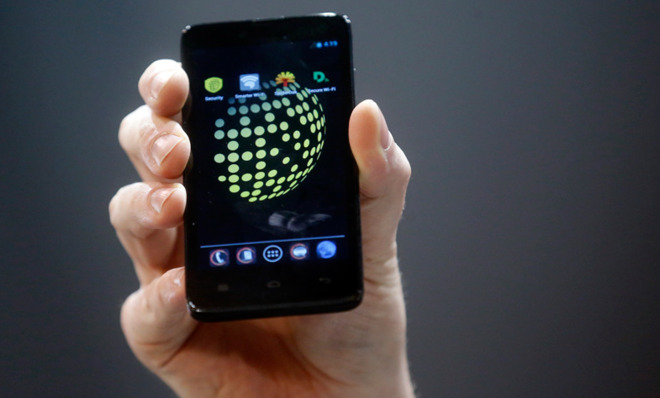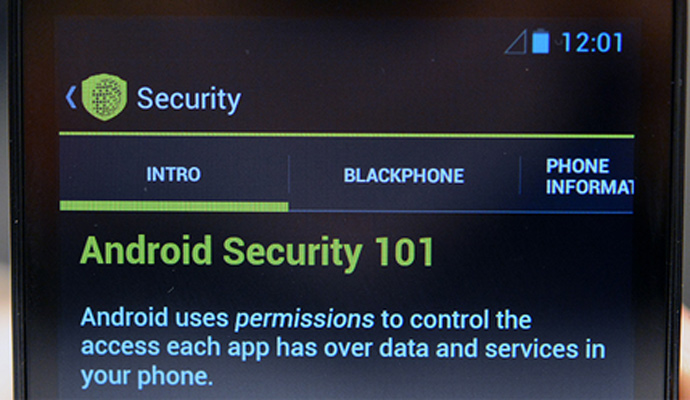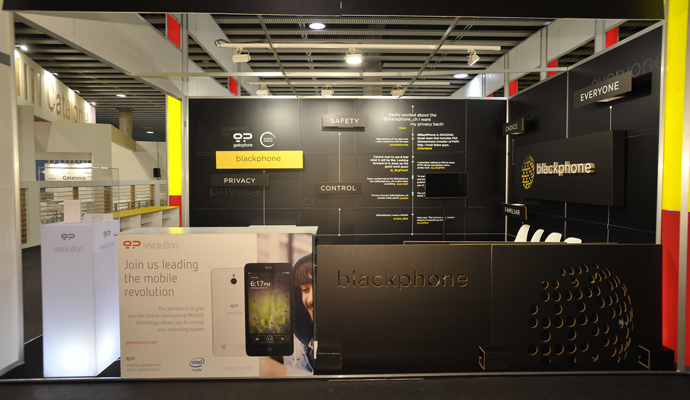Can technology rescue us from technology?
Or will combating technological paranoia with technology just result in more paranoia?

A free daily email with the biggest news stories of the day – and the best features from TheWeek.com
You are now subscribed
Your newsletter sign-up was successful

Do you ever walk around with a feeling of unease, as if something is watching you, following you? Well, that thing following you is your phone.
Or if not your phone, it's technology in general. The 2014 U.S. State of Cybercrime Survey found that 77 percent of people who responded had businesses that were affected by cybercrime, which is up 34 percent from people who responded the year before. But fear of technology is more than just a monetary issue. Studies have shows that email alone causes a ridiculous amount of anxiety.
Fortunately, for the most alarmed of us out there, the Blackphone has come along. And it's already being called "the Android for the paranoid."
The Week
Escape your echo chamber. Get the facts behind the news, plus analysis from multiple perspectives.

Sign up for The Week's Free Newsletters
From our morning news briefing to a weekly Good News Newsletter, get the best of The Week delivered directly to your inbox.
From our morning news briefing to a weekly Good News Newsletter, get the best of The Week delivered directly to your inbox.
As Sean Gallagher writes in a review in Ars Technica, the Blackphone has an "excellent security center feature" called "PrivatOS," which gives you "fine control over app permissions." In addition, the phone offers options like the "Silent Phone" and the "Silent Text" services, designed to "anonymize and encrypt communications so no one can eavesdrop on voice, video, and text calls at all." It also has a "Smart Wi-Fi Manager" that makes sure the phone doesn't connect to unfriendly networks and its "Disconnect VPN and Search keep web trackers away from your phone, anonymize your searches and internet traffic."
Despite all these security-heavy features, Gallagher does note that the Blackphone has some network issues, a slightly confusing interface, and is a bit lacking in general performance. Plus, its very nature makes it less compatible with the "Google ecosystem." (Nevertheless, Gallagher acknowledges that, in terms of privacy, the Blackphone does what it's supposed to.)
The ironic thing about the Blackphone, and about all the similar kinds of inventions that are sure to follow it, is that it relies on the idea that technology can save you from technology.

The Blackphone's inception has surely been brewing for awhile. As any good science-fiction writer will tell you, paranoia surrounding technology isn't anything new. The difference is that now that Weltanschauung seems valid. As Mike Jay at Aeon Magazine observes:
A free daily email with the biggest news stories of the day – and the best features from TheWeek.com
Popular culture hums with stories about technology that secretly observes and controls our thoughts, or in which reality is simulated with virtual constructs or implanted memories, and where the truth can be glimpsed only in distorted dream sequences or chance moments when the mask slips. A couple of decades ago, such beliefs would mark out fictional characters as crazy, more often than not homicidal maniacs. Today, they are more likely to identify a protagonist who…genuinely has stumbled onto a carefully orchestrated secret of which those around him are blandly unaware. These stories obviously resonate with our technology-saturated modernity. [Aeon Magazine]
But for most people, technological paranoia manifests more casually, through the little concerns of everyday life in the digital age. The direct message that you accidentally tweet or the text that you clumsily send to the wrong person — these are potential realities of the world we live in. Most of the time, such factors are innocuous — but a certain level of caution is warranted. Under the right circumstances, the wrong "reply all" can have disastrous consequences.
But paranoia also fuels technology's march forward. For one thing, there's a constant sense of panic among the world's biggest tech giants over who will get there first, wherever "there" happens to be. Technology is reliant on well-established human fears, simply because there's money in exploiting our cultural angst; as the BBC reports, the amount of gadgets that have been created to play into the insecurity of new parents alone, that make them think they need technology to keep their baby safe, is staggering.
How well supposed "life-saving" technology works is an entirely different matter from self-checking technology though. The matter is complicated, first and foremost, by the fact that the tech world's most gargantuan companies are also the worst when it comes to privacy. Products like the Blackphone are always going to be essentially less accessible for most people until some of these companies change their policies. The truth is that for now, getting rid of paranoia may also mean getting rid of convenience.
The next issue the Blackphone faces is that it's coming along at a time when many believe the cybersecurity boom is over. As Fortune's Yoav Leitersdorf and Ofer Schreiber write, "Investors have been too enthusiastic, and as a result, the shares of cybersecurity companies are overpriced. Overinvestment has been rampant in both the public and private markets."
However, the difference between the Blackphone and other security offerings is that the Blackphone makes security personal. By being centered around privacy above all else, the Blackphone puts the control right in your hand, and that's no small feat. Evidence suggests that mobile devices will play an important part in the developing security technologies of the future, and the Blackphone is at the forefront in this regard.

On top of this, the Blackphone's introduction is significant because it denotes a shift in the way people think about their cell phones specifically. In the wake of the NSA scandal and Target's major security breach, it's become clear that as citizens and as consumers, we aren't safe from the dangers of technology. But the Blackphone suggests that we aren't safe from ourselves, either.
This isn't too surprising. According to Business Insider's Jim Edwards, statistics indicate that people now spend more time consuming media on their smartphone than on any other platform. Brenda Goodman of The New York Times further notes that we're hearing and feeling our cell phones even when they're inactive. Goodman writes, "While phantom rings may generate reactions from curiosity to irritation, at least explanations for the phenomenon exist. More mysterious are phantom phone vibrations, a cellphone side effect that many people said they also have experienced. It seems that having a phone set to vibrate can cause a particularly physical kind of false alarm."
Considering how big a part our smartphones play in our daily lives, is it any wonder we're starting to get paranoid about how we use them? More to the point, is the Blackphone and similar technology the answer?
Much of this depends on how willing one is to buy into the idea of intelligent machines in general. Authors like Ray Kurzweil believe they are inevitable, and to the most paranoid of all, the question then becomes whether technology will eventually stop protecting us and form a will of its own. But in the meantime, it doesn't seem feasible to even suggest that we can defend ourselves from the onslaught of the digital world without technology; to assume otherwise would be to assume you can outrace a car with a horse. As we make technology smarter, more capable of policing itself, the only result can be that we become more reliant on it. But at this point, the alternative is to forsake technology entirely.
If this question seems like a paradox to you, you're not wrong. Combating technological paranoia with technology may result in more paranoia. Ultimately, one's comfort level with the notion will probably be determined by their own feelings on technology. University of North Carolina, Wilmington professor Diana Walsh-Pasulka ponders these questions as they appear in the Wachowskis' The Matrix Reloaded.
Just before Neo embarks on his journey to overthrow the offending computers and save a small portion of humankind who are freed from the matrix and living in a city in the middle of the earth (aptly named Zion), he reflects on the nature of technology with "the counselor," (Anthony Zerbe). The counselor questions the irony of humankind's dependence on machines and computers, which generate the basic conveniences of modern life, while in the midst of a war with wayward computers. Neo claims that the difference is that the computers they use can be turned off, which is not true of the offending computers. The counselor, however, has the last word. Can we turn our computers off?
Turning our computers off completely no longer feels possible. But if we can at least feel safe when we turn them on, then there is still hope.
From our friends at The Daily Dot, by Chris Osterndorf.
More from The Daily Dot...
-
 James Van Der Beek obituary: fresh-faced Dawson’s Creek star
James Van Der Beek obituary: fresh-faced Dawson’s Creek starIn The Spotlight Van Der Beek fronted one of the most successful teen dramas of the 90s – but his Dawson fame proved a double-edged sword
-
 Is Andrew’s arrest the end for the monarchy?
Is Andrew’s arrest the end for the monarchy?Today's Big Question The King has distanced the Royal Family from his disgraced brother but a ‘fit of revolutionary disgust’ could still wipe them out
-
 Quiz of The Week: 14 – 20 February
Quiz of The Week: 14 – 20 FebruaryQuiz Have you been paying attention to The Week’s news?